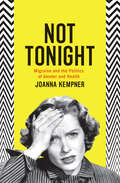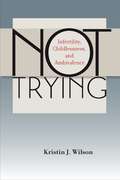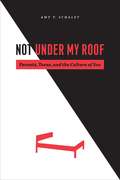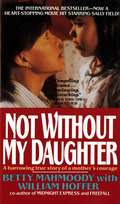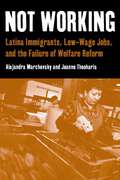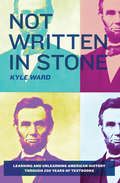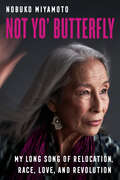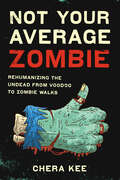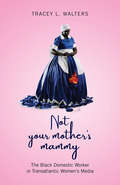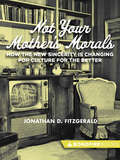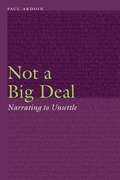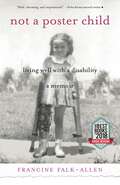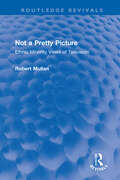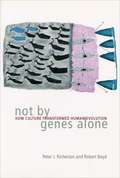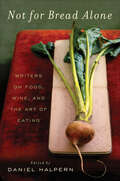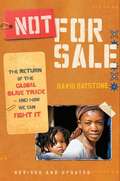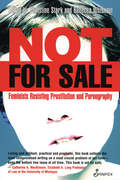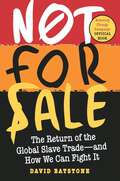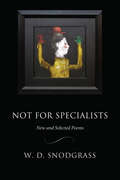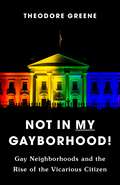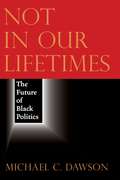- Table View
- List View
Not Tonight: Migraine and the Politics of Gender and Health
by Joanna Kempner&“[An] insightful and eloquent account of our evolving understandings of migraine, from a condition of weak-nerved women, to a &‘real&’…disease&” (Elizabeth Mitchell Armstrong Princeton University). Pain. Vomiting. Hours and days spent lying in the dark. Migraine is an extraordinarily common, disabling, and painful disorder that affects over 36 million Americans and costs the US economy at least $32 billion per year. Nevertheless, it is a frequently dismissed, ignored, and delegitimized condition. In Not Tonight, sociologist Joanna Kempner argues that this general dismissal of migraine can be traced back to the gendered social values embedded in the way we talk about, understand, and care for people in pain. The symptoms that accompany headache disorders—like head pain, visual auras, and sensitivity to sound—lack objective markers of distress that can confirm their existence. Therefore, doctors must rely on the perceived moral character of their patients to gauge how serious their complaints are. Kempner shows how this subjective dimension of diagnosis has shaped the history of migraine. In the nineteenth-century, migraine was seen as a disorder of upper-class intellectual men and hysterical women. In the 1940s, the concept of &“migraine personality&” developed, in which women with migraine were described as uptight neurotics who withheld sex. Even today, we see depictions of people with highly sensitive &“migraine brains.&” Not Tonight casts new light on how cultural beliefs about gender, pain, and the distinction between mind and body influence not only whose suffering we legitimate, but which remedies are marketed, how medicine is practiced, and how knowledge about disease is produced.
Not Trying: Infertility, Childlessness, and Ambivalence
by Kristin J. WilsonOne message that comes along with ever-improving fertility treatments and increasing acceptance of single motherhood, older first-time mothers, and same-sex partnerships, is that almost any woman can and should become a mother. The media and many studies focus on infertile and involuntarily childless women who are seeking treatment. They characterize this group as anxious and willing to try anything, even elaborate and financially ruinous high-tech interventions, to achieve a successful pregnancy. But the majority of women who struggle with fertility avoid treatment. The women whose interviews appear in Not Trying belong to this majority. Their attitudes vary and may change as their life circumstances evolve. Some support the prevailing cultural narrative that women are meant to be mothers and refuse to see themselves as childfree by choice. Most of these women, who come from a wider range of social backgrounds than most researchers have studied, experience deep ambivalence about motherhood and non-motherhood, never actually choosing either path. They prefer to let life unfold, an attitude that seems to reduce anxiety about not conforming to social expectations.
Not Trying: Infertility, Childlessness, and Ambivalence
by Kristin J. WilsonOne message that comes along with ever-improving fertility treatments and increasing acceptance of single motherhood, older first-time mothers, and same-sex partnerships, is that almost any woman can and should become a mother. The media and many studies focus on infertile and involuntarily childless women who are seeking treatment. They characterize this group as anxious and willing to try anything, even elaborate and financially ruinous high-tech interventions, to achieve a successful pregnancy. But the majority of women who struggle with fertility avoid treatment. The women whose interviews appear in Not Trying belong to this majority. Their attitudes vary and may change as their life circumstances evolve. Some support the prevailing cultural narrative that women are meant to be mothers and refuse to see themselves as childfree by choice. Most of these women, who come from a wider range of social backgrounds than most researchers have studied, experience deep ambivalence about motherhood and non-motherhood, never actually choosing either path. They prefer to let life unfold, an attitude that seems to reduce anxiety about not conforming to social expectations.
Not Under My Roof: Parents, Teens, and the Culture of Sex
by Amy T. SchaletWinner of the Healthy Teen Network’s Carol Mendez Cassell Award for Excellence in Sexuality Education and the American Sociological Association's Children and Youth Section's 2012 Distinguished Scholarly Research Award For American parents, teenage sex is something to be feared and forbidden: most would never consider allowing their children to have sex at home, and sex is a frequent source of family conflict. In the Netherlands, where teenage pregnancies are far less frequent than in the United States, parents aim above all for family cohesiveness, often permitting young couples to sleep together and providing them with contraceptives. Drawing on extensive interviews with parents and teens, Not Under My Roof offers an unprecedented, intimate account of the different ways that girls and boys in both countries negotiate love, lust, and growing up. Tracing the roots of the parents’ divergent attitudes, Amy T. Schalet reveals how they grow out of their respective conceptions of the self, relationships, gender, autonomy, and authority. She provides a probing analysis of the way family culture shapes not just sex but also alcohol consumption and parent-teen relationships. Avoiding caricatures of permissive Europeans and puritanical Americans, Schalet shows that the Dutch require self-control from teens and parents, while Americans guide their children toward autonomous adulthood at the expense of the family bond.
Not Without My Daughter
by Betty Mahmoody William HofferIn August 1984, Michigan housewife Betty Mahmoody accompanied her husband to his native Iran for a two-week vacation. To her horror, she found herself and her four-year-old daughter, Mahtob, virtual prisoners of a man rededicated to his Shiite Moslem faith, in a land where women are near-slaves and Americans are despised. Their only hope for escape lay in a dangerous underground that would not take her child. . . Now the true story of this courageous woman and her breathtaking odyssey bursts upon the screen in the Pathe Entertainment production starring Academy Award-winner Sally Field! A Literary Guild Alternate Selection.
Not Working: Latina Immigrants, Low-Wage Jobs, and the Failure of Welfare Reform
by Alejandra Marchevsky Jeanne TheoharisNot Working chronicles the devastating effects of the 1996 welfare reform legislation that ended welfare as we know it. For those who now receive public assistance, “work” means pleading with supervisors for full-time hours, juggling ever-changing work schedules, and shuffling between dead-end jobs that leave one physically and psychically exhausted.Through vivid story-telling and pointed analysis, Not Working profiles the day-to-day struggles of Mexican immigrant women in the Los Angeles area, showing the increased vulnerability they face in the welfare office and labor market. The new “work first” policies now enacted impose time limits and mandate work requirements for those receiving public assistance, yet fail to offer real job training or needed childcare options, ultimately causing many families to fall deeper below the poverty line.Not Working shows that the new “welfare-to-work” regime has produced tremendous instability and insecurity for these women and their children. Moreover, the authors argue that the new politics of welfare enable greater infringements of rights and liberty for many of America's most vulnerable and constitute a crucial component of the broader assault on American citizenship. In short, the new welfare is not working.
Not Written in Stone: Learning and Unlearning American History Through 200 Years of Textbooks
by Kyle WardA teaching edition of the &“thought-provoking study&” History in the Making, which explores how our view of the history changes over time (Library Journal). Kyle Ward&’s celebrated History in the Making struck a chord among readers of popular history. &“Interesting and useful,&” according to Booklist, the book &“convincingly illustrates how texts change as social and political attitudes evolve.&” With excerpts from history textbooks that span two hundred years, History in the Making looks at the different ways textbooks from different eras interpret and present the same historical events. Not Written in Stone offers an abridged and annotated version of History in the Making specifically designed for classroom use. In each section, Ward provides an overview, questions for discussions and analysis, and then a fascinating chronological sampling of textbook excerpts which reveal the striking differences between textbooks over time. An exciting new teaching tool, Not Written in Stone is destined to become a staple of classroom teaching about the American past. &“Students, teachers, and general readers will learn more about the past from these passages than from any single work, however current, that purports to monopolize the truth.&” —Ray Raphael, author of Founding Myths
Not Yo' Butterfly: My Long Song of Relocation, Race, Love, and Revolution (American Crossroads #60)
by Nobuko MiyamotoA mold-breaking memoir of Asian American identity, political activism, community, and purpose.Not Yo’ Butterfly is the intimate and unflinching life story of Nobuko Miyamoto—artist, activist, and mother. Beginning with the harrowing early years of her life as a Japanese American child navigating a fearful west coast during World War II, Miyamoto leads readers into the landscapes that defined the experiences of twentieth-century America and also foregrounds the struggles of people of color who reclaimed their histories, identities, and power through activism and art. Miyamoto vividly describes her early life in the racialized atmosphere of Hollywood musicals and then her turn toward activism as an Asian American troubadour with the release of A Grain of Sand—considered to be the first Asian American folk album. Her narrative intersects with the stories of Yuri Kochiyama and Grace Lee Boggs, influential in both Asian and Black liberation movements. She tells how her experience of motherhood with an Afro-Asian son, as well as a marriage that intertwined Black and Japanese families and communities, placed her at the nexus of the 1992 Rodney King riots—and how she used art to create interracial solidarity and conciliation. Through it all, Miyamoto has embraced her identity as an Asian American woman to create an antiracist body of work and a blueprint for empathy and praxis through community art. Her sometimes barbed, often provocative, and always steadfast story is now told.
Not Your Average Zombie: Rehumanizing the Undead from Voodoo to Zombie Walks
by Chera KeeA thorough analysis of zombies in popular culture from the 1930s to contemporary society.The zombie apocalypse hasn&’t happened—yet—but zombies are all over popular culture. From movies and TV shows to video games and zombie walks, the undead stalk through our collective fantasies. What is it about zombies that exerts such a powerful fascination? In Not Your Average Zombie, Chera Kee offers an innovative answer by looking at zombies that don&’t conform to the stereotypes of mindless slaves or flesh-eating cannibals. Zombies who think, who speak, and who feel love can be sympathetic and even politically powerful, she asserts.Kee analyzes zombies in popular culture from 1930s depictions of zombies in voodoo rituals to contemporary film and television, comic books, video games, and fan practices such as zombie walks. She discusses how the zombie has embodied our fears of losing the self through slavery and cannibalism and shows how &“extra-ordinary&” zombies defy that loss of free will by refusing to be dehumanized. By challenging their masters, falling in love, and leading rebellions, &“extra-ordinary&” zombies become figures of liberation and resistance. Kee also thoroughly investigates how representations of racial and gendered identities in zombie texts offer opportunities for living people to gain agency over their lives. Not Your Average Zombie thus deepens and broadens our understanding of how media producers and consumers take up and use these undead figures to make political interventions in the world of the living.&“Kee provides a compelling synthesis of theory and criticism . . . useful for horror scholars interested in how portrayals of zombie intersect with race and gender.&” —Popular Culture Studies Journal&“Kee&’s Not Your Average Zombie is an important book . . . Put simply: if it's the one book you read about or cite on zombie, you've made an excellent choice.&” —American Quarterly&“[Not Your Average Zombie] offers a fresh theoretical framework to a fast-growing field . . . A fascinating contribution to the critical conversation about the zombie as a fantastic figure.&” —Journal of the Fantastic in the Arts&“I&’m impressed by Kee&’s scholarship across several fields—film history and gender and critical race studies, especially—and her cultural and historical contextualizing of the current zombie renaissance.&” —James H. Cox, University of Texas at Austin, author of The Red Land to the South: American Indian Writers and Indigenous Mexico
Not Your Mother's Mammy: The Black Domestic Worker in Transatlantic Women’s Media
by Tracey L WaltersNot Your Mother’s Mammy examines how black artists of the African diaspora, many of them former domestics, reconstruct the black female subjectivities of domestics in fiction, film, and visual and performance art. In doing so, they undermine one-dimensional images of black domestics as victims lacking voice and agency and prove domestic workers are more than the aprons they wear. An analysis of selected media by Alice Childress, Nandi Keyi, Victoria Brown, Kara Walker, Mikalene Thomas, Rene Cox, Lynn Nottage, and others provides examples of generations of domestics who challenged their performative roles of subservience by engaging in subversive actions contradicting the image of the deferential black maid. Through verbal confrontation, mobilization, passive resistance, and performance, black domestics find their voices, exercise their power, and maintain their dignity in the face of humiliation. Not Your Mother’s Mammy brings to life stories of domestics often neglected in academic studies, such as the complexity of interracial homoerotic relationships between workers and employers, or the mental health challenges of domestics that lead to depression and suicide. In line with international movements like #MeToo and #timesup, the women in these stories demand to be heard.
Not Your Mother's Morals: How the New Sincerity Is Changing Pop Culture for the Better
by Jonathan D. Fitzgerald&“[Fitzgerald] explains how the new sincerity movement in contemporary pop culture is making way for moral storytelling in unlikely places.&” —Jonathan Merritt, author of Learning to Speak God from Scratch In Not Your Mothers Morals, Jonathan D. Fitzgerald argues that today&’s popular music, movies, TV shows, and books are making the world a better place. For all the hand-wringing about the decline of morals and the cheapening of culture in our time, contemporary media brims with examples of fascinating and innovative art that promote positive and uplifting moral messages—without coming across as preachy. The catch? Today&’s moral messages can be quite different than the ones your mother taught you. Fitzgerald compares the pop culture of yesterday with that of today and finds that while both are committed to major ideals—especially God, Family, and Country—the nature of those commitments has shifted. In his witty, expressive style, Fitzgerald explains how we&’ve arrived at the era of New Sincerity and why its good news for our future. &“A great, quick read . . . jam-packed with explorations of art, politics, media and pop culture that show how we&’ve moved from being June Cleaver&’s society to being one that begs you to just tell it to us like it is—flaws and questions and all . . . Jonathan&’s book puts all of the proverbial pieces together into one witty journey that will light up any culture lover&’s brain.&” —The Good Men Project &“Jonathan Fitzgerald is an astute observer of Christianity in Western culture. By turning &‘conventional wisdom&’ on its head, he shows us some truth we would not otherwise have seen.&” —Tony Jones, author of The New Christians
Not a Big Deal: Narrating to Unsettle (Frontiers of Narrative)
by Paul ArdoinNot a Big Deal asks how texts might work to unsettle readers at a moment when unwelcome information is rejected as fake news or rebutted with alternative facts. When readers already recognize &“defamiliarizing texts&” as a category, how might texts still work toward the goals of defamiliarization? When readers refuse to grapple with texts that might shock them or disrupt their extant views about politics, race, or even narrative itself, how can texts elicit real engagement? This study draws from philosophy, narratology, social neuroscience, critical theory, and numerous other disciplines to read texts ranging from novels and short stories to graphic novels, films, and fiction broadcasted and podcasted—all of which enact curious strategies of disruption while insisting that they do no such thing. Following a model traceable to Toni Morrison&’s criticism and short fiction, texts by Kyle Baker, Scott Brown, Percival Everett, Daniel Handler, David Robert Mitchell, Jordan Peele, and Colson Whitehead suggest new strategies for unsettling the category-based perceptions behind what Everett calls &“the insidious colonialist reader&’s eye which infects America.&” Not a Big Deal examines problems in our perception of the world and of texts and insists we do the same.
Not a Passing Phase: Reclaiming Lesbians in History, 1840-1985
by Lesbian History GroupA collection of essays and articles about "romantic friendships" between famous women of the past.
Not a Poster Child: Living Well with a Disability—A Memoir
by Francine Falk-Allen2019 Living Now Book Awards Gold Medal Winner in Inspirational/Memoir (Female) 2018 Sarton Women's Book Awards finalist in Memoir Kirkus Reviews' Best Books of 2018 2018 Sarton Women's Book Awards Silver Medal in Memoir Francine Falk-Allen was only three years old when she contracted polio and temporarily lost the ability to stand and walk. Here, she tells the story of how a toddler learned grown-up lessons too soon; a schoolgirl tried her best to be a &“normie,&” on into young adulthood; and a woman finally found her balance, physically and spiritually. In lucid, dryly humorous prose, she also explores how her disability has affected her choices in living a fulfilling (and amusing) life in every area—relationships, career, religion (or not), athleticism, artistic expression, and aging, to name a few. A clear-eyed examination of living with a handicap, Not a Poster Child is one woman&’s story of finding her way to a balanced life—one with a little cheekiness and a lot of joy.
Not a Pretty Picture: Ethnic Minority Views of Television (Routledge Revivals)
by Robert MullanOriginally published in 1996, ethnic minorities in the UK made up over 5% of the population yet were hardly represented in the hundreds of hours of terrestrial broadcast television each week. The blatant racism of The Black and White Minstrel Show was over, but more subtle forms of racism were piped into our living rooms in an endless stream of white-dominated programming. ‘Comedies’ and soaps presented non-whites as a sort of joke humanity – stereotypical, simple and amusingly childish. Serious programmes swelled on the negative aspects of ethnicity: race as a problem, cultural clashes and language barriers. Above all – not white equals not normal. For many years critics of popular television argued that such imbalance was harmful. The lack of positive non-white TV role models for children to identify with was leading to growing alienation and disaffection. Ethnic minorities increasingly defined themselves in opposition to white institutions. They were turning towards separate channels – narrow-casting – provided to meet their own TV needs. Based on both extensive survey research and interviews with actual viewers, Not a Pretty Picture investigates the whole issue of TV and ethnic minority viewers at the time: their viewing choices, their criticisms, their feeling about the way they are portrayed. The conclusions are damning: for most of Britain’s ethnic minority communities TV was a white medium, predominantly controlled by whites, portraying white culture and denying non-whites a voice. Not a Pretty Picture, however, provides a voice for these views and a valuable insight into the way ethnic minorities see TV. Today it can be read in its historical context, to see how far we have come, as well as what still needs to be done.
Not by Bread Alone: Social Support in the New Russia
by Melissa L. CaldwellThe book addresses the phenomenon of poverty in Russian today through an ethnography of a transnational soup kitchen community in Moscow.
Not by Genes Alone: How Culture Transformed Human Evolution
by Peter J. Richerson Robert BoydA groundbreaking theory of the role of culture in evolution, this book offers a radical interpretation of human evolution, arguing that our ecological dominance and our singular social systems stem from a psychology uniquely adapted to create complex culture.
Not for Bread Alone: Writers on Food, Wine, and the Art of Eating
by Daniel HalpernTwenty-two acclaimed writers celebrate the art of eatingWendell Berry • Colette • William Corbett • Michael Dorris • Alexandre Dumas • M. F .K. Fisher • Michael Frank • Betty Fussell • Evan Jones • Judith B. Jones • Barbara Kafka • Madeline Kamman • Charles Lamb • Rose Macaulay • Henry Matthews • Joyce Carol Oates • Francine Prose • Paul Schmidt • James Seay • Charles Simic • Edward Steinberg • Alice WatersThere is more to be gained from our daily bread than mere sustenance. Curiosity, romance, ritual, and insight can be as much a part of a meal as any of its edible ingredients. In this delectable collection of essays on fine food and drink, twenty-two renowned writers capture the gestures, the celebrations, and the moments in which food, wine, and the act of eating transcend their initial purposes to become something far greater. A window into the eating lives of a handful of our finest literary artists, Not for Bread Alone is a tasty and most satisfying delight—a true culinary classic.
Not for Sale
by David BatstoneHuman trafficking generates $32 billion annually and enslaves over 30 million people, half of them children. Award-winning journalist David Batstone, whom Bono calls "a heroic character," profiles the new generation of abolitionists who are leading the movement. This groundbreaking global report is now updated with the latest findings, new stories, and statistics that highlight what is being done to end this appalling epidemic--and how you can join the movement.
Not for Sale: Feminists Resisting Prostitution and Pornography
by Rebecca Whisnant Christine StarkIncluding the latest research on prostitution and pornography, this essay anthology shows how the sex industries harm those within them while undermining the possibilities for gender justice, human equality, and stable sexual relationships. From sex industries survivors to social activists and theorists such as Taylor Lee, Adriene Sere, and Kristen Anderberg, this volume asses from a feminist perspective the racism, poverty, militarism, and corporate capitalism of selling sex through strip clubs, brothels, mail-order brides, and child pornography.
Not for Sale: The Return of the Global Slave Trade—and How We Can Fight It
by David Batstone“Human trafficking is not an issue of the left or right, blue states or red states, but a great moral tragedy we can unite to stop . . . Not for Sale is a must-read to see how you can join the fight.” —Jim Wallis, author of God's Politics“David Batstone is a heroic character.” —BonoIn the revised and updated version of this harrowing yet deeply inspirational exposé, award-winning journalist David Batstone gives the most up-to-date information available on the $31 billion human trafficking epidemic. With profiles of twenty-first century abolitionists like Thailand’s Kru Nam and Peru’s Lucy Borja, Batstone tells readers what they can do to stop the modern slave trade. Like Kevin Bales’ Disposable People and Ending Slavery, or E. Benjamin Skinner’s A Crime So Monstrous, Batstone’s Not for Sale is an informative and necessary manifesto for universal freedom.
Not for Specialists: New and Selected Poems (American Poets Continuum)
by W.D. SnodgrassUntil the late 1970s, W. D. Snodgrass was known primarily as a confessional poet and a key player in the emergence of that mode of poetry in the late 1950s and early 1960s. Snodgrass makes poetry out of the daily neuroses and everyday failures of a man—a husband, father, and teacher. This domestic suffering occurs against a backdrop of more universal suffering which Snodgrass believes is inherent in the human experience. Not for Specialists includes 35 new poems complemented by the superb work he wrote in the Pulitzer Prize winning collection, Heart’s Needle, along with poetry from seven other distinguished collections.from "Nocturnes"Seen from higher up, it makes its first move in the low creekbed, the marshlands down the valley, spreading across the open hayfields, the hedgerows with their tops still lit, laps the roadbed, flows over lawns and gardens, past the house and up the wooded hillside back behind us till only some few rays still scythe between the treetrunks from the far horizon and are gone.W. D. Snodgrass, born in Pennsylvania in 1926, is the author of more than 20 books of poetry, including The Fuehrer Bunker: The Complete Cycle (BOA, 1995); Each in His Season (BOA, 1993); and Heart's Needle (1959), which won the Pulitzer Prize for Poetry. His other books include To Sound Like Yourself: Essays on Poetry (BOA, 2002), After-Images: Autobiographical Sketches (BOA, 1999) and six volumes of translation, including Selected Translations (BOA Editions, 1998), which won the Harold Morton Landon Translation Award.
Not from Here, Not from There/No Soy de Aquí ni de Allá: The Autobiography of Nelson Díaz
by Nelson A. DiazRaised in the squalor of a New York tenement until he was 10 years old, Nelson Díaz saw his life change when his family moved to a brand-new high-rise project in West Harlem in the 1950s. That experience, along with lessons learned as the only Latino law student at Temple University, would drive him throughout his life as a lawyer and activist, fighting for the expansion of rights for all Americans. “No soy de aquí ni de allá” is a mantra for Puerto Ricans who feel like foreigners wherever they are and who seek a place for themselves. In his inspiring autobiography, Not from Here, Not from There, Díaz tells the story of his struggles and triumphs as his perspective widened from the New York streets and law school classrooms to the halls of power in Philadelphia and Washington, DC. Whether as a leader in economic development, a pioneer in court reform, or a champion of fair housing, Díaz has never stopped advocating for others. Díaz was happy to be the first Latino to “do something,” but he never wanted to be the last. This story of an outsider who worked his way to the inside offers powerful lessons on finding a place in the world by creating spaces where everyone is welcome.
Not in My Gayborhood: Gay Neighborhoods and the Rise of the Vicarious Citizen
by Theodore GreeneGay neighborhoods are disappearing—or so the conventional story goes. In this narrative, political gains and mainstream social acceptance, combined with the popularity of dating apps like Grindr, have reduced the need for LGBTQ+ people to seek refuges or build expressly queer places. Yet even though residential patterns have shifted, traditionally gay neighborhoods remain centers of queer public life.Exploring “gayborhoods” in Washington, DC, Theodore Greene investigates how neighborhoods retain their cultural identities even as their inhabitants change. He argues that the success and survival of gay neighborhoods have always depended on participation from nonresidents in the life of the community, which he terms “vicarious citizenship.” Vicarious citizens are diverse self-identified community members, sometimes former or displaced locals, who make symbolic claims to the neighborhood. They defend their vision of community by temporarily reviving the traditions and cultures associated with the gay neighborhood and challenging the presence of straight families and other newcomers, the displacement of local institutions, or the taming of sexual culture. Greene pays careful attention to the significance of race and racism, highlighting the important role of Black LGBTQ+ culture in shaping gay neighborhoods past and present. Examining the diverse placemaking strategies that queer people deploy to foster and preserve LGBTQ+ geographies, Not in My Gayborhood illuminates different ways of imagining urban neighborhoods and communities.
Not in Our Lifetimes: The Future of Black Politics
by Dawson Michael C.In the aftermath of Hurricane Katrina, polls revealed that only 20 percent of African Americans believed that racial equality for blacks would be achieved in their lifetime. But following the election of Barack Obama, that number leaped to more than half. Did that dramatic shift in opinion really reflect a change in the vitality of black politics--and hope for improvement in the lives of African Americans? Or was it a onetime surge brought on by the euphoria of an extraordinary election? With Not in Our Lifetimes, Michael C. Dawson shows definitively that it is the latter: for all the talk about a new post-racial America, the fundamental realities of American racism--and the problems facing black political movements--have not changed. He lays out a nuanced analysis of the persistence of racial inequality and structural disadvantages, and the ways that whites and blacks continue to see the same problems--the disastrous response to Katrina being a prime example--through completely different, race-inflected lenses. In fact, argues Dawson, the new era heralded by Obama's election ist more racially complicated, as the widening class gap among African Americans and the hot-button issue of immigration have the potential to create new fissures for conservative and race-based exploitation. Bringing his account up to the present with a thoughtful account of the rise of the Tea Parties and the largely successful "blackening" of the president, Dawson ultimately argues that black politics remains weak--and that achieving the dream of racial and economic equality will require the sort of coalition-building and reaching across racial divides that have always marked successful political movements. Polemical but clear-eyed, passionate but pragmatic, Not in Our Lifetimes will force us to rethink our easy assumptions about racial progress--and begin the hard work of creating real, lasting change.
